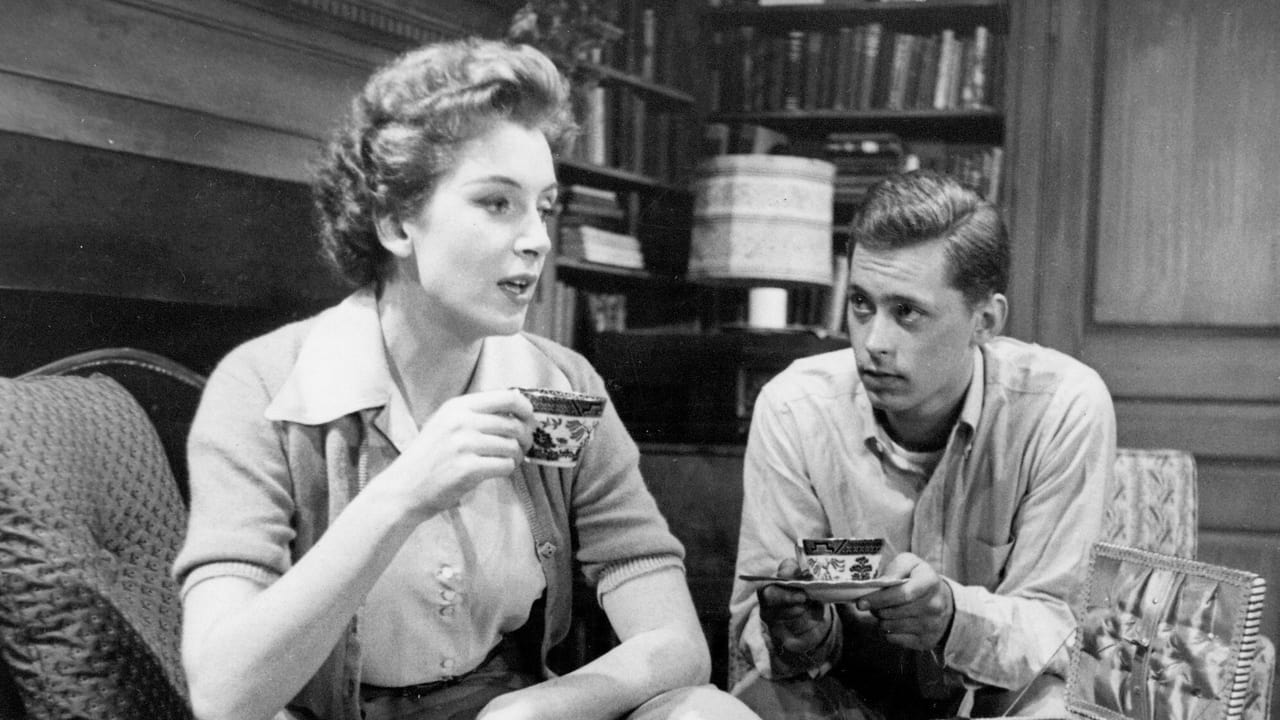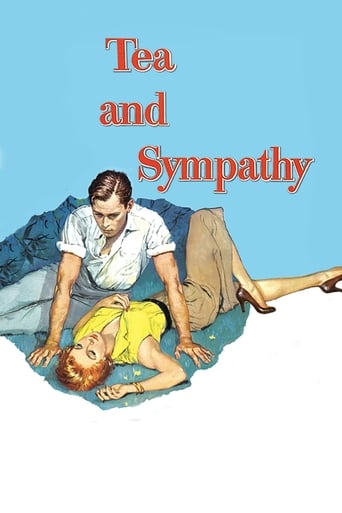Stellead
Don't listen to the Hype. It's awful
Borgarkeri
A bit overrated, but still an amazing film
Ginger
Very good movie overall, highly recommended. Most of the negative reviews don't have any merit and are all pollitically based. Give this movie a chance at least, and it might give you a different perspective.
Edwin
The storyline feels a little thin and moth-eaten in parts but this sequel is plenty of fun.
PWNYCNY
Conformity is a drag, especially when it's imposed on someone. That is the theme of this movie. It's no joke being the target of a smear campaign, especially when the smearing is groundless. Overall, this is a good movie. John Kerr and Deborah Kerr give excellent performances as two persons who discover that they have a lot in common. Metaphors abound in this movie; characters take on sociological meaning. The movie is both subtle and powerful. The movie portrays the kind of repressiveness that can literally drive one to despair. Of course, being based a stage play, the movie itself is also stagy. Nevertheless, the actors succeed in bringing the story to life. Although the story revolves around the relationship between a married woman and a young teenage boy in a boarding school, it is more about the woman and less about the boy who is an instrument through which the woman gets in touch with her own feelings. The movie deals with this storyline in a forthright manner and for that reason alone this movie is worth watching. Kudos to Deborah Kerr for a marvelous performance.
bkoganbing
Tea And Sympathy offers a rare chance to see the three Broadway leads of Robert Anderson's play repeat their roles. Although they didn't finish the 712 performance run, Deborah Kerr, John Kerr, and Leif Erickson all do a fine job on the screen. Tea And Sympathy actually won two Tony Awards for Anthony Perkins and Mary Fickett who replaced both the Kerrs in the Broadway run.It goes without saying that if the film were done today, it would be a lot more frank about the characters. John Kerr would be more definitely bisexual and Leif Erickson would have his issues more openly discussed.John Kerr is a sensitive kid who doesn't quite fit into the gender roles that back in the Fifties were pretty rigid. At the boys prep school he attends, the other kids call him 'sister boy' and tease him pretty bad. The only one who notices his plight with any degree of concern is Deborah Kerr who lives in his dormitory with her husband Leif Erickson. Deborah was married once before to a young man killed in the war and John reawakens something of her feelings. In the end she gives her all to John.Sadly Leif Erickson's performance is sadly overlooked when discussing Tea And Sympathy. He comes across at first as the usual jock lout, but it goes quite a bit deeper than that. The Code did not permit a more open performance, but Erickson's is one of the best examples of a self hating latent gay man I've ever seen on film. Notice the only time he really comes alive is when he's with his boys doing all the imbecilic rite of passage things that are encouraged in society back then and in some cases still are. In the end Deborah realizes that she really doesn't mean anything to Erickson, although the tacked on ending is something of a cop out.Another performance that stands out is that of Edward Andrews who is John Kerr's father. He and Erickson unite in the fact that they want young Kerr to butch it up and start taking up more masculine endeavors.In these days of the suicides of young gay youth hitting the national media, with government finally taking notice of the problem, Tea And Sympathy takes on a frightening relevance. The characters from the Fifties will be immediately recognized by many today, most especially the young who are going through exactly what John Kerr is.
Robert J. Maxwell
There's some touching and unintentionally amusing material here. Deborah Kerr is the sensitive mistress of a boarding house for a couple of college kids, and the wife of bluff Lief Erickson, headmaster. One of the kids who lives upstairs is John Kerr. She's not only nurturant, she's gorgeous too, despite the lurid period make up.Kerr is the odd kid out. He doesn't walk like a man. He was taught to sew by his maid after his mother's death. He has long hair instead of the ubiquitous crew cuts. He doesn't know any girls. He doesn't know how to dance. He has no interest in making a fortune after he graduates. He listens to classical music and wants to become a folk singer. He reads "poetry" off by himself. He wins at tennis but not by forceful drives but by chops and slices. At one point, his father, Edward Andrews, visits the campus and asks his old friend Erickson how Kerr is making out. Erickson lowers his face and forces himself to reveal all: "He was found on the beach with the faculty wives -- SEWING." Deborah Kerr observes all this and can't keep herself from interfering, although the rules declare that she must do nothing more than provide "tea and sympathy" to the boys on Sundays.D. Kerr goes much farther than that to help the wounded J. Kerr. She begs J. Kerr's empathic but helpless room mate to give him lessons on masculinity. She argues with her husband over the rough treatment, begs him to see that it stops. He's compelled to refuse. Maybe some rough treatment will make a man of J. Kerr.Well, all of this is mighty dated. First of all, J. Kerr is not merely "out of step" with the others, which is all the movie script implies. He's a homosexual dressed in the moral code of the time. Second of all, all those buzz-cut jock types playing grabass on the beach and bragging about their conquests are stand-ins for the attitudes that some felt the nations of the Free World should take towards the Collectivists behind the Iron Curtain. Treat 'em rough and maybe it will teach 'em a lesson. Most forcefully, and most generally, this is a critique of the very real enforced conformity of the 1950s which the Beatniks finally challenged publicly.The stereotypes abound. Not in real life. I doubt that in the 1950s, or maybe EVER, was the gender structure of campus life ever so bifurcated, except maybe in some isolated and selective settings. The stereotypes represent, not verisimilitude, but the intention of the screenwriter, Robert Anderson, to simplify our vision of life so that our choices are made more easily. In this case, both of the Kerrs are right and everyone else is wrong. There now. Wasn't that easy? At times the script becomes almost hilarious, a self parody. The boys alternately shun and humiliate J. Kerr. They call him "Sissy Boy." But D. Kerr knows better. If he has grave doubts about his own masculinity, she solves the problem by seducing him in a furry glade. Thus, she "cures" him of his homosexual disease.What I'd have loved in that tender scene is to see it go beyond the point at which the beautiful and liminally sexual D. Kerr slips off her sweater, gently clasps J. Kerr's face to her bosom, and says, "When you talk about this in later years -- and you will -- be kind." First of all, I'd like to have seen a little more eagerness on the part of the neglected, love-starved wife, more than just the desire to help someone else. After all, she thinks he's an ithyphallic eighteen-year-old stud-in-waiting. I'd have loved to see a graphic sexual scene in which J. Kerr turns out to be completely impotent despite the most ardent ministrations of D. Kerr. I'd have liked seeing J. Kerr disgusted throughout the ordeal. And finally he should have stood up, buttoned his clothes, and spat out an insult, "Keep your filthy hands off me from now on, you witch. If you want to talk to me in the future, I'll be at Shelley's making focaccio. And -- by the way -- that DRESS you're wearing is a complete CATASTROPHE." Her husband, playing rough house with the boys out on the gridiron, should suffer an injury that causes him to lose one of his testicles. J. Kerr's room mate, the one bulging with muscles, the one with a neck the width of a utility pole, should be found in the bathroom stall with a muscle man magazine in his lap. The captain of the football squad needs have his closet full of ladies' shoes revealed.That would have provided a perfect ending to a movie that now, from our current enlightened, sophisticated, liberated, and thoroughly corrupt perspective, we can recognize for the comic enterprise that it is.
MarieGabrielle
This film came to audiences at a rather schizophrenic time, things were changing, but not that much. Roles were assimilated, but not too drastically. People were questioning things, as long as it wasn't radical.Women were still patronized, there were still clear role boundaries (witness the scene where Tom is knitting and catches derision for spending ten minutes in a sewing circle.) Not sure why that was a crime of the century, but whatever.Deborah Kerr is tender and memorable as an unhappy wife to the school master at a prep school who realizes her marriage is a sham. She realizes this when she sympathizes with a student and resident at her home, a confused young man who simply is shy and has doubts about his future. There are some nuances regarding sexuality, but in all honesty that was a side-story, from what I inferred.The message I take away from this film is not simply about ostracism and hatred; Minnelli as director also addresses female emotion, the reasons why Kerr empathizes with the young man, and how he eventually moves on. In the long rung, it is life affirming, although rather opaque in its message.Discrimination and hatred take many forms, and sometimes the subtler forms are most repellent. Highly recommended. 8/10.

